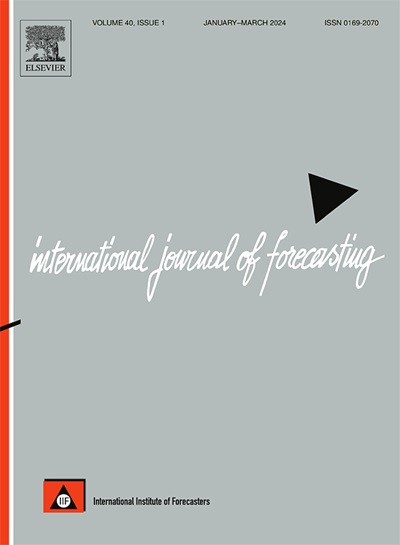Do oil price forecast disagreement of survey of professional forecasters predict crude oil return volatility?
IF 7.1
2区 经济学
Q1 ECONOMICS
引用次数: 0
Abstract
This paper explores whether the dispersion in forecasted crude oil prices from the European Central Bank Survey of Professional Forecasters can provide insights for predicting crude oil return volatility. It is well-documented that higher disagreement among forecasters of asset price implies greater uncertainty and higher return volatility. Using several Generalized Autoregressive Conditional Heteroskedasticity with Mixed Data Sampling (GARCH-MIDAS) models, we find, based on the in-sample estimation results, the oil market experiences greater volatility when the forecasters’ disagreements increase. The model that integrates both historical realized variance and forward-looking forecaster disagreement into the conditional variance, along with the model focusing solely on pure forward-looking forecaster disagreement, exhibits a much superior fit to the data compared to the model relying solely on realized variance and the models considering forward-looking forecasted mean return. The out-of-sample forecasting results unequivocally illustrate that incorporating forecaster disagreement offers valuable insights, markedly enhancing the predictive accuracy of crude oil return volatility within the GARCH-MIDAS model. Moreover, we illustrate the economic benefit of considering forecasters’ disagreement when forecasting volatility, demonstrating its significance for VaR risk management.
专业预测师调查中的油价预测分歧能否预测原油收益波动?
本文探讨了欧洲中央银行专业预测者调查所得出的原油价格预测离散度是否能为预测原油收益波动性提供启示。有大量文献表明,资产价格预测者之间的分歧越大,意味着不确定性越大,回报波动性越高。我们使用几个具有混合数据抽样的广义自回归条件异方差(GARCH-MIDAS)模型,根据样本内估计结果发现,当预测者之间的分歧增大时,石油市场的波动性也会增大。将历史已实现方差和前瞻性预测者分歧整合到条件方差中的模型,以及只关注纯粹前瞻性预测者分歧的模型,与只依赖已实现方差的模型和考虑前瞻性预测平均收益率的模型相比,与数据的拟合效果要好得多。样本外预测结果清楚地表明,将预测者分歧纳入 GARCH-MIDAS 模型可提供有价值的见解,显著提高原油收益波动的预测准确性。此外,我们还说明了在预测波动性时考虑预测者分歧的经济效益,证明了其对 VaR 风险管理的重要意义。
本文章由计算机程序翻译,如有差异,请以英文原文为准。
求助全文
约1分钟内获得全文
求助全文
来源期刊

International Journal of Forecasting
Multiple-
CiteScore
17.10
自引率
11.40%
发文量
189
审稿时长
77 days
期刊介绍:
The International Journal of Forecasting is a leading journal in its field that publishes high quality refereed papers. It aims to bridge the gap between theory and practice, making forecasting useful and relevant for decision and policy makers. The journal places strong emphasis on empirical studies, evaluation activities, implementation research, and improving the practice of forecasting. It welcomes various points of view and encourages debate to find solutions to field-related problems. The journal is the official publication of the International Institute of Forecasters (IIF) and is indexed in Sociological Abstracts, Journal of Economic Literature, Statistical Theory and Method Abstracts, INSPEC, Current Contents, UMI Data Courier, RePEc, Academic Journal Guide, CIS, IAOR, and Social Sciences Citation Index.
 求助内容:
求助内容: 应助结果提醒方式:
应助结果提醒方式:


